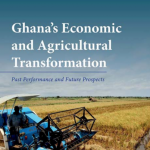Ghana is West-Africa’s top producer of tilapia. Growth in Ghana’s aquaculture sector is being driven mainly by large-scale cage tilapia farming in Lake Volta. Tilapia contributes over 77% of cultured fish production, the second being African catfish at 22%. Unfortunately, participation of, women, and youth in this rapidly growing value chain is very limited. About […]
Value Chain Development to benefit smallholders in Ghana: The effectiveness of selected interventions
Value chains are series of activities or processes that aim at creating and adding value to any product at every step during the production process. How, where, and when might it be appropriate to intervene in value chains, particularly to benefit smallholders? In their paper on value chain development, Shashi Kolavalli and co-authors examined interventions […]
Agricultural Growth Key to Spur Ghana’s Economic Growth
With the right kinds of policies and investments, Ghana could enhance its agricultural exports, reduce its food imports, and in the process create many more productive jobs along agricultural value chains.
Employment, diversifying rural livelihoods, and youth: Lessons for Ghana from the 2019 Global Food Policy Report
by Noora-Lisa Aberman and Radhika Lal Throughout much of Africa south of the Sahara, rural households earn their incomes primarily from agriculture and rapid rural population growth is putting pressure on governments to create jobs. In Ghana, agriculture employs over 40% of the population, but average farm productivity remains low, a problem for rural livelihoods […]
Agriculture and poverty reduction
What is the future of agriculture in Ghana? And what are the implications for poverty reduction? IFPRI Senior Research Fellow James Thurlow addresses these questions in an essay published in the Gate's Foundation Goalkeepers Report. He writes that "if you asked most Ghanaians where the opportunities of the future lie, they would point to Accra, […]
- 1
- 2
- 3
- …
- 7
- Next Page »




